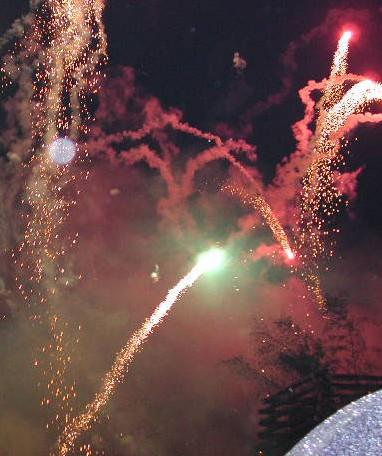Thursday, December 01, 2005
Like being in the country
November 30, 2005 copyright The New York Times
Feeding the Beast for Light in New Orleans
By ADAM NOSSITER
NEW ORLEANS, Nov. 29 - The generator people are internal colonists, staking out islands of light in the sea of dark still covering much of the city.
In lives where the monstrous, belching backyard power generator is king - where a streetlight flickers tantalizingly, say, in the near distance, but their own block is black - the machine's subjects must follow its rules.
Every night at 1 a.m. it calls Willie Solomon, 62, or her husband, Raymond, 68, into the cold and dark, out of the warm bed. Armed with a flashlight, they feed it: two five-gallon cans of gasoline a day, and sometimes more depending on what is plugged in. But they do not plug in too much. The fuel bill already runs $135 a week.
It naps at noon and is ready for ear-splitting action again at 5:30 p.m.
Barely more than a quarter of this city's prestorm households are illuminated by the power company. Some neighborhoods have limped on since Hurricane Katrina; others have barely budged. When night comes, these electricityless pioneers - nobody knows how many there are - live in a shrunken world, reduced to a few lighted rooms, inside their house, on a darkened block. Scavengers roam, they say, and it is best not to be out.
The roaring beast gives back power in exchange for the gas, through long, snaking cords running all through Ms. Solomon's frayed camelback house in the St. Roch neighborhood, in the Eighth Ward of the city. At night, with a few rooms illuminated by a naked bulb, she must walk on tiptoe to avoid tripping on these tentacles, taped fast to the linoleum.
Water for washing is heated on a hot plate and dumped into a big plastic bucket; baths are military-style rubdowns in a darkened, chilly bathroom; red beans are cooked on a low-power crockpot; and laundry is done by hand.
"Other than that, I just say, I just got to go back to the old days, pretend I'm in the country," said Ms. Solomon, a good-humored former Los Angeles school district guard who says her 30-year absence from the city she calls "Noo Erlens" pained her.
"I'm living the old-time way; I never thought I'd go back to the country," Ms. Solomon said. "Yes indeed, it's pitch-black."
She sleeps in a sweatsuit, wears a big fur-lined hat in bed and walks around the cold house during the day in what she calls Eskimo boots, lined with plush fur. Doorways are hung with blankets, to cut down on the penetrating, chilly draft of a late New Orleans autumn, and windows are sealed up with plastic sheeting. Cold is as much of an enemy in these uninsulated old wooden houses as the intense heat of summer.
"Yeah, the country," Ms. Solomon said. "Being in the country."
She and a neighbor, Brenda Batiste, are the only ones on this semi-abandoned block off Elysian Fields Avenue. Ms. Batiste, 62, has domesticated her generator, covered it with a leopard-skin cloth and a turtle yard ornament, and keeps it dormant much of the time.
She cannot afford to run a refrigerator on it, uses candles at night and must unplug the televisions to turn on the hot plate. Her little shotgun home is darker than Ms. Solomon's house. "This is three months," she said. "It starts to wear on you, your outer being as well."
At night, the glow from the illuminated French Quarter and Faubourg Marigny, a mile or more distant, casts a pale light on the block.
This area flooded, though not as extensively as the nearby Lower Ninth Ward. Every so often the innards of an emptied house are spilled onto the sidewalk: Sheetrock, toys, beer cans, CD's, bits of clothing, a stool.
A neighbor one street over said he chased two looters out of a house on a recent evening, and faced down another pair with a .22-caliber revolver. Many front doors swing wide open day and night, and some may never be locked again.
"At about 5:30 everybody's inside," Ms. Solomon said. "You've got to worry about the thieves." All the neighboring houses have been broken into, she said, adding, "I don't even know what they're looking to steal."
The police say they are aware of the looting problem and have formed squads to deal with it. Arrests have been made, police officials say.
But this is not a welcoming environment. Ms. Solomon, with her rooms stuffed full of toys and teddy bears for the grandchildren, her portrait of John F. Kennedy by the door and a refrigerator - turned off - covered with outlandish magnets, is not giving up.
"I've been fussing with the utility companies for the longest time," she said placidly. "I've been fussing and fussing. Sometimes, I think they're punishing me for being here. There's one little old lady here, and they can't even get my lights on."
************
Note: Mortgage payments are due today on damaged homes. These were deferred for 3 months, and are now due. The good news is that the bankers, for now, are not planning foreclosures because they don't see any value in owning the damaged homes. Stay tuned.
Feeding the Beast for Light in New Orleans
By ADAM NOSSITER
NEW ORLEANS, Nov. 29 - The generator people are internal colonists, staking out islands of light in the sea of dark still covering much of the city.
In lives where the monstrous, belching backyard power generator is king - where a streetlight flickers tantalizingly, say, in the near distance, but their own block is black - the machine's subjects must follow its rules.
Every night at 1 a.m. it calls Willie Solomon, 62, or her husband, Raymond, 68, into the cold and dark, out of the warm bed. Armed with a flashlight, they feed it: two five-gallon cans of gasoline a day, and sometimes more depending on what is plugged in. But they do not plug in too much. The fuel bill already runs $135 a week.
It naps at noon and is ready for ear-splitting action again at 5:30 p.m.
Barely more than a quarter of this city's prestorm households are illuminated by the power company. Some neighborhoods have limped on since Hurricane Katrina; others have barely budged. When night comes, these electricityless pioneers - nobody knows how many there are - live in a shrunken world, reduced to a few lighted rooms, inside their house, on a darkened block. Scavengers roam, they say, and it is best not to be out.
The roaring beast gives back power in exchange for the gas, through long, snaking cords running all through Ms. Solomon's frayed camelback house in the St. Roch neighborhood, in the Eighth Ward of the city. At night, with a few rooms illuminated by a naked bulb, she must walk on tiptoe to avoid tripping on these tentacles, taped fast to the linoleum.
Water for washing is heated on a hot plate and dumped into a big plastic bucket; baths are military-style rubdowns in a darkened, chilly bathroom; red beans are cooked on a low-power crockpot; and laundry is done by hand.
"Other than that, I just say, I just got to go back to the old days, pretend I'm in the country," said Ms. Solomon, a good-humored former Los Angeles school district guard who says her 30-year absence from the city she calls "Noo Erlens" pained her.
"I'm living the old-time way; I never thought I'd go back to the country," Ms. Solomon said. "Yes indeed, it's pitch-black."
She sleeps in a sweatsuit, wears a big fur-lined hat in bed and walks around the cold house during the day in what she calls Eskimo boots, lined with plush fur. Doorways are hung with blankets, to cut down on the penetrating, chilly draft of a late New Orleans autumn, and windows are sealed up with plastic sheeting. Cold is as much of an enemy in these uninsulated old wooden houses as the intense heat of summer.
"Yeah, the country," Ms. Solomon said. "Being in the country."
She and a neighbor, Brenda Batiste, are the only ones on this semi-abandoned block off Elysian Fields Avenue. Ms. Batiste, 62, has domesticated her generator, covered it with a leopard-skin cloth and a turtle yard ornament, and keeps it dormant much of the time.
She cannot afford to run a refrigerator on it, uses candles at night and must unplug the televisions to turn on the hot plate. Her little shotgun home is darker than Ms. Solomon's house. "This is three months," she said. "It starts to wear on you, your outer being as well."
At night, the glow from the illuminated French Quarter and Faubourg Marigny, a mile or more distant, casts a pale light on the block.
This area flooded, though not as extensively as the nearby Lower Ninth Ward. Every so often the innards of an emptied house are spilled onto the sidewalk: Sheetrock, toys, beer cans, CD's, bits of clothing, a stool.
A neighbor one street over said he chased two looters out of a house on a recent evening, and faced down another pair with a .22-caliber revolver. Many front doors swing wide open day and night, and some may never be locked again.
"At about 5:30 everybody's inside," Ms. Solomon said. "You've got to worry about the thieves." All the neighboring houses have been broken into, she said, adding, "I don't even know what they're looking to steal."
The police say they are aware of the looting problem and have formed squads to deal with it. Arrests have been made, police officials say.
But this is not a welcoming environment. Ms. Solomon, with her rooms stuffed full of toys and teddy bears for the grandchildren, her portrait of John F. Kennedy by the door and a refrigerator - turned off - covered with outlandish magnets, is not giving up.
"I've been fussing with the utility companies for the longest time," she said placidly. "I've been fussing and fussing. Sometimes, I think they're punishing me for being here. There's one little old lady here, and they can't even get my lights on."
************
Note: Mortgage payments are due today on damaged homes. These were deferred for 3 months, and are now due. The good news is that the bankers, for now, are not planning foreclosures because they don't see any value in owning the damaged homes. Stay tuned.


 "Wherever I am, my blog turns towards Eretz Yisrael
" - JAMEEL
"Wherever I am, my blog turns towards Eretz Yisrael
" - JAMEEL "blogs are best when served with shiraz" - The Godol HaDor
"blogs are best when served with shiraz" - The Godol HaDor Questions about your life? Go AskShifra.
Questions about your life? Go AskShifra.